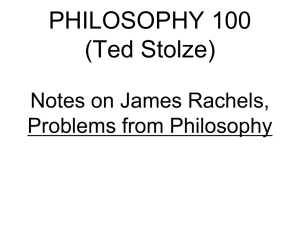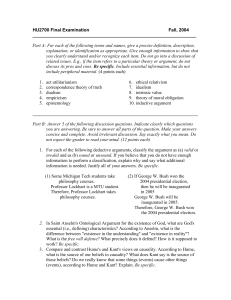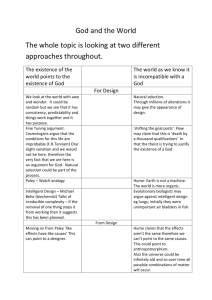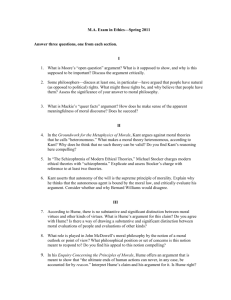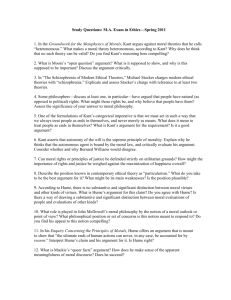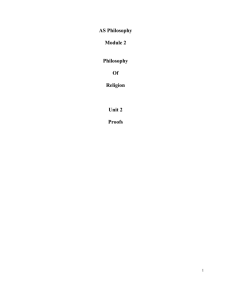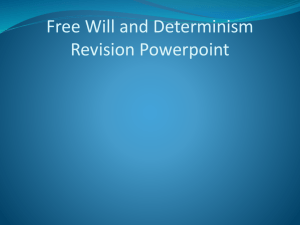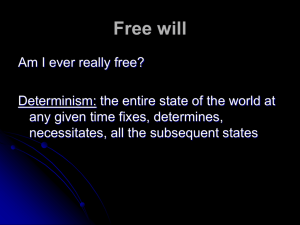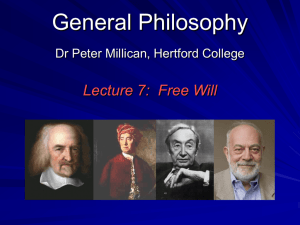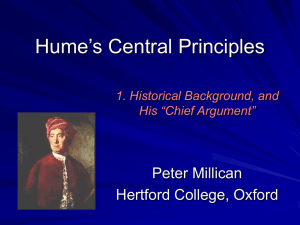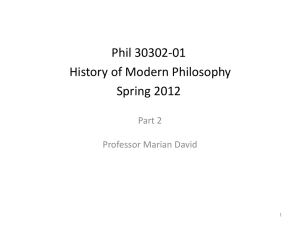HU2700: Exam 2 Spring, 2003
advertisement
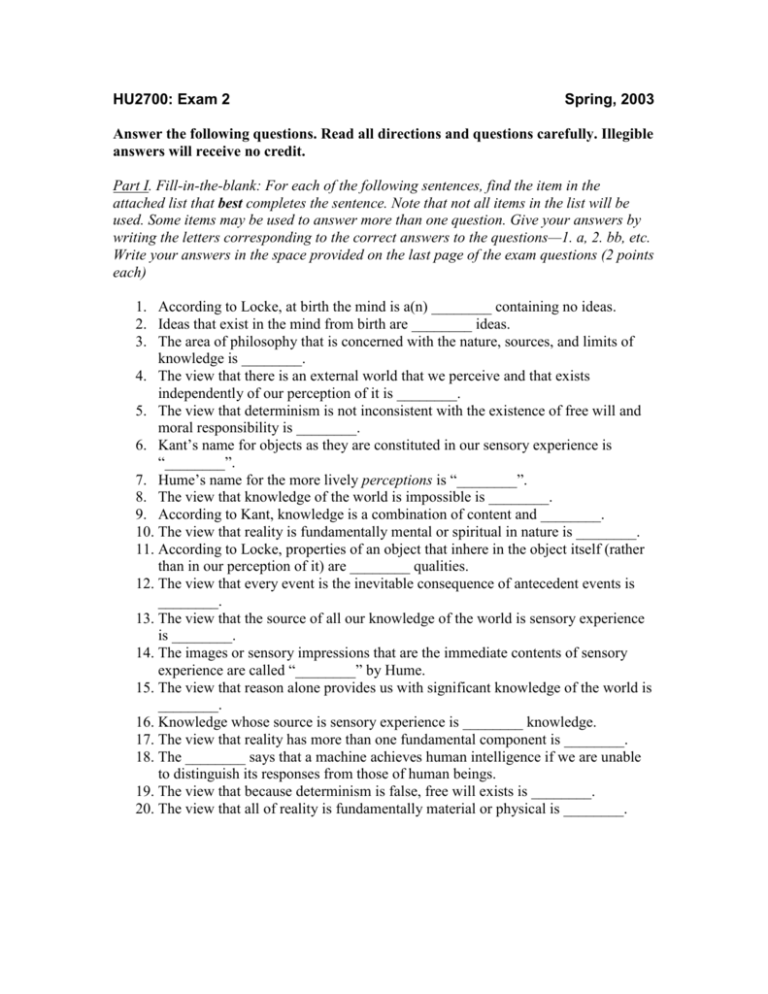
HU2700: Exam 2 Spring, 2003 Answer the following questions. Read all directions and questions carefully. Illegible answers will receive no credit. Part I. Fill-in-the-blank: For each of the following sentences, find the item in the attached list that best completes the sentence. Note that not all items in the list will be used. Some items may be used to answer more than one question. Give your answers by writing the letters corresponding to the correct answers to the questions—1. a, 2. bb, etc. Write your answers in the space provided on the last page of the exam questions (2 points each) 1. According to Locke, at birth the mind is a(n) ________ containing no ideas. 2. Ideas that exist in the mind from birth are ________ ideas. 3. The area of philosophy that is concerned with the nature, sources, and limits of knowledge is ________. 4. The view that there is an external world that we perceive and that exists independently of our perception of it is ________. 5. The view that determinism is not inconsistent with the existence of free will and moral responsibility is ________. 6. Kant’s name for objects as they are constituted in our sensory experience is “________”. 7. Hume’s name for the more lively perceptions is “________”. 8. The view that knowledge of the world is impossible is ________. 9. According to Kant, knowledge is a combination of content and ________. 10. The view that reality is fundamentally mental or spiritual in nature is ________. 11. According to Locke, properties of an object that inhere in the object itself (rather than in our perception of it) are ________ qualities. 12. The view that every event is the inevitable consequence of antecedent events is ________. 13. The view that the source of all our knowledge of the world is sensory experience is ________. 14. The images or sensory impressions that are the immediate contents of sensory experience are called “________” by Hume. 15. The view that reason alone provides us with significant knowledge of the world is ________. 16. Knowledge whose source is sensory experience is ________ knowledge. 17. The view that reality has more than one fundamental component is ________. 18. The ________ says that a machine achieves human intelligence if we are unable to distinguish its responses from those of human beings. 19. The view that because determinism is false, free will exists is ________. 20. The view that all of reality is fundamentally material or physical is ________. Part II. Answer one question from each of the 3 following groups of questions (for a total of 3 questions). Indicate clearly which questions you are answering. Make your answers concise but complete. Avoid irrelevant discussion. Say exactly what you mean. Do not expect the grader to interpret your writing or to “read between the lines.” Write your answers on separate sheets (20 points each) Group A 1. State in detail one of the main arguments against materialism. (Hint: The conclusion of the argument should be “Materialism is false.”) Explain precisely how the argument is supposed to work. Is the argument valid? Why or why not? Be specific. [Reminder: A valid argument is one for which it is inconceivable that both the premises are all true and the conclusion is false.] 2. State in detail one of the main arguments against dualism. (Hint: The conclusion of the argument should be “Dualism is false.”) Explain precisely how the argument is supposed to work. Is the argument valid? Why or why not? Be specific. Group B 3. What exactly is the problem of personal identity? What are the four main theories of the self? Pick one of those theories and state the main considerations supporting and denying that theory. Be specific. 4. Pick either determinism, libertarianism, or compatibilism. State one of the main arguments supporting that view. (Hint: The conclusion of the argument should be “Determinism/libertarianism/compatibilism is true.”) Then state one of the main arguments denying that view. (Hint: The conclusion of the argument should be “Determinism/libertarianism/compatibilism is false.”) Be specific. Group C 5. Compare and contrast the epistemological theories of Locke, Berkeley, and Hume. For each of the three, explain in detail why he was an empiricist. Did they disagree about our knowledge of the continued existence of ordinary physical objects? If so, explain in detail the nature of their disagreement. 6. How did Hume’s epistemological views led to skepticism? Explain in detail. What sorts of things was he skeptical about? How did Kant attempt to avoid Hume’s skeptical conclusions? Explain in detail. Name _______________________ a. b. c. d. e. f. g. h. i. j. k. l. m. n. o. p. q. r. s. a posteriori a priori analytic antirealism behaviorism Berkeley, George body Buddhism bundle of perceptions category causality clear and distinct ideas compatibilism consciousness content contingent continued existence continuity Copernican revolution in knowledge t. u. v. w. Descartes, Rene determinism dualism eliminative materialism x. empiricism y. epistemology z. external aa. form bb. functionalism cc. Hume, David dd. idealism ee. identity theory ff. impressions gg. innate hh. Kant, Immanuel ii. libertarianism jj. Locke, John kk. materialism ll. memory mm. metaphysics nn. mind oo. mind-body problem Answers to Part I Questions: 1. ____ 6. ____ 11. ____ 16. ____ 2. ____ 7. ____ 12. ____ 17. ____ 3. ____ 8. ____ 13. ____ 18. ____ 4. ____ 9. ____ 14. ____ 19. ____ 5. ____ 10. ____ 15. ____ 20. ____ pp. qq. rr. ss. tt. uu. vv. ww. xx. yy. zz. aaa. bbb. ccc. ddd. eee. fff. ggg. hhh. iii. jjj. no-self view noumena perceptions personal identity phenomena pineal gland primary rationalism realism reason reductionism secondary self sense data skepticism solipsism soul synthetic tabula rasa thought experiment transcendental idealism kkk. Turing test
